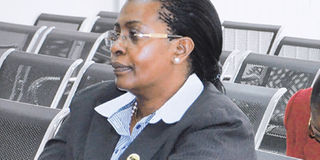Former Eala speaker fights removal

Former Eala Speaker Margaret Zziwa follows a proceedings at the East African Court of Justice during her case in 2014.PHOTO|FILE
What you need to know:
- She told the East African Court of Justice (EACJ) at the start of hearing of a case she filed that her ejection from the position also infringed Article 53 and 56 of the Treaty for the Establishment of the East African Community.
- Ms Zziwa, a member of the regional Assembly from Uganda, was elected Eala Speaker in June 2012 but bowed out of Office after her impeachment on December 19, 2014.
Arusha. The former Speaker of the East African Legislative Assembly (Eala), Ms Margaret Zziwa, has challenged her removal from Office, describing it as illegal.
She told the East African Court of Justice (EACJ) at the start of hearing of a case she filed that her ejection from the position also infringed Article 53 and 56 of the Treaty for the Establishment of the East African Community.
Ms Zziwa, a member of the regional Assembly from Uganda, was elected Eala Speaker in June 2012 but bowed out of Office after her impeachment on December 19, 2014.
She was succeeded by Daniel Kidega, also from Uganda, as the new Speaker. She had been an Eala member since 2007 and was re-elected in 2012, this time landing on the Speaker’s job.
She is seeking for her reinstatement on grounds that her removal was illegal and that because of the intimidations she went through she is seeking $2 million (Sh4.1 billion) as compensation in terms of salary, legal costs and compensation as she suffered reputation damage.
Ms Zziwa refuted allegations against her which included poor governance and leadership skills and poor time management and laissez-faire attitude towards the Assembly responsibilities.
She also denied before the First Instance Division of the Court that there was no rented house for her in Arusha because she hardly stays in the city and had been here only during Eala sessions and other official duties in her capacity.
It was also alleged that during her tenure she had involved members of her family in office matters which allegedly led to family intervention in the affairs of the Assembly with her husband being disrespectful to Eala members.
Other allegations which led to her removal were misallocation of resources earmarked for the Assembly plenary to other matters of personal interest as Global Parliamentary on Habitat (GPH) that utilised the days programmed for the Assembly.
There were also claims that during her tenure as Speaker she was not attending the Eala meetings when invited, practising nepotism, disrespect and intimidation of members of staff, using media to character assassinate fellow members, refusal to advice and loss of confidence and trust.
She told the Court currently holding a session in Arusha that once she was served with the motion of removal she responded to the MPs that the allegations were not true and just framed up. She also attempted to have the issue settled diplomatically, including seeking the intervention of the EAC Heads of State, but her efforts did not succeed.
Ms Zziwa also said that on May 9, 2014, EACJ gave an interim order in the Application by Eala MP from Uganda Fred Mbidde Mukasa in relation to interpretation of Rule 53 of the Eala rules of procedure and that the Court gave a ruling on May 29, 2014 that the Assembly has its rules of procedure and allowed Eala to use them in the removal proceedings.
She also mentioned that on June 3, 2014, there was a long debate in the Assembly about the motion on the removal of the Speaker which the Members were debating whether it should be tabled or not because the signatures had been removed and the motion was not tabled.
She further explained that members of the Assembly from Tanzania had withdrawn their signatures and she did not have a new motion with the required signatures and the motion was therefore out of time.
She added that according to Rule 9 (2) of Eala rules of procedure on the removal of the Speaker, a motion for the removal of the Speaker shall be signed by at least four members from each of the five EAC partner states and submitted to the Clerk of the Assembly.
She also said that Rule 9 94) provides that the Motion shall be tabled in the Assembly within seven days of its receipt by the Clerk and, the house shall refer the motion to the legal rules and privileges Committee to investigate and the report of its findings would be tabled before the Assembly for debate.
The Clerk of the Assembly received the notice on March 26, 2014 and received the motion on March 27, 2014 and it was brought to the Assembly on 1st June 2014 which she claims was out of time.
Ms Mumbi Ng’aru, an Eala member from Kenya, gave evidence to the effect that she was very active in resolving the conflict of the illegal removal of Ms Zziwa and that at one time she attempted to resolve it through the Eala women caucus but the conflict never ended.
She added that the allegations against Zziwa were not true and when they met President Yoweri Museveni of Uganda to discuss the same issue nothing came out of it.
The Kenyan legislator also told the Court that the Speaker was removed from her position in her absence. She therefore concluded her evidence by pleading to Court to assist Eala so that such illegality should never happen in future.
The Applicant only had one witness to call apart from herself as the other three were not available due to different reasons as some were not in Arusha, including Ms Suzan Nakawuki from Uganda who had requested to give her evidence through video conferencing. However, the Court could not allow that because of the short notice.




